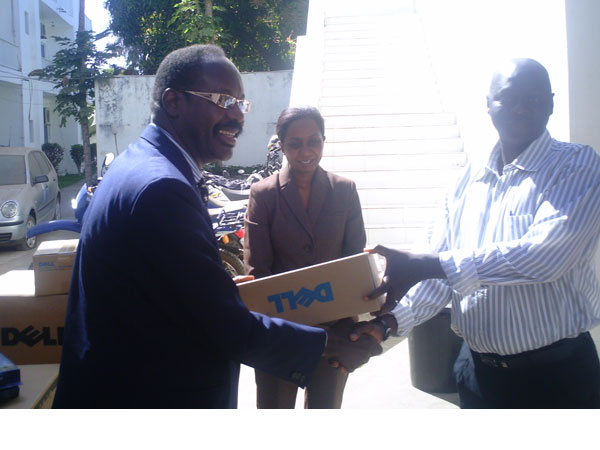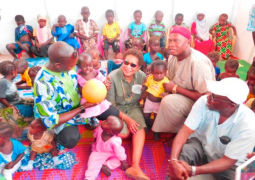
The United Nations Development Programme (UNDP) under its United Nations Democracy Fund (UNDEF) Capacity Building project yesterday handed over at the UN House at Cape Point equipment and furniture to media houses and Civil Society Organizations in the country.
The equipment, worth over US$50, 000 includes among other things, office equipment, computers and IT facilities and accessories, digital cameras, generators and recorders.
The beneficiaries were The Point and Foroyaa newspapers, Gambia Radio and Television Services (Radio), Agency for the Development of Women and Children (ADWAC), the Child Protection Alliance (CPA), the Association of Farmers, Educators and Traders (AFET) and The Gambia Press Union (GPU).
Speaking at the occasion Ms. Linya Ellayeb, UNDP Deputy Resident Representative, said the project, with a two-year funding, aims to strengthen the professional standards and financial viability of media houses to advocate for human development issues in The Gambia. It also aims to strengthen the capacity of CSOs, to monitor and respond to economic and political decisions at national and local levels as well as to enhance the policy and legal environment for protection of rights and civic participation in the decision-making processes. She said through the media the Gambian population will be in a position to get all the information to make informed choices on national issues ranging from problems pertaining to HIV/AIDS to issues of government decision making process, adding that similarly through civic engagement to the Gambian society can be directly involved in the economic, social and political development of its nation, and can hold officials accountable for their programmes.
She said that it is against this background that the project, 'Capacity Building of Mass Media and Civil Society' was launched to bring about a more vibrant media community and civil society that is aligned to the national and global agenda, and the rights-based approach to development.
She said: "They say a healthy nation is measured by the health of its civil society. I like to say healthy government is measured by the health of its civil society. Any nation can achieve its goals if it has a contract with the civil society, the private sector and religious leaders; and if it creates the environment where each actor is carrying their share of the burden of development.
"These four pillars- government, civil society, the private sector and the religious institutions- these pillars will hold each other accountable. Under such a contract the rule of law and the protection of civilians will be upheld".
According to her, The Gambia has an ambitious agenda in the Vision 20/20, and the MDG-based Poverty Reduction Strategy (PRSP II), which she said reflect the country's strategic development objectives, identify key challenges, and embody the national commitment to poverty reduction and sustained growth.
She affirmed that UNDP is firmly committed to supporting these development efforts as is reflected in the Country Program Action Plan (CPAP) which was signed between the Government of The Gambia and UNDP.
Other speakers included Mr. Nyakassi Jarjue of Action Aid, which is tasked with the project implementation. Ndey Tapha Sosseh, President of GPU. The occasion was graced by Fatim Badjie-Janneh and Ismaila Sambou, Secretaries of State for Communication, Information and Information Technology, and Local Government and Lands respectively.
Read Other Articles In Article (Archive)


